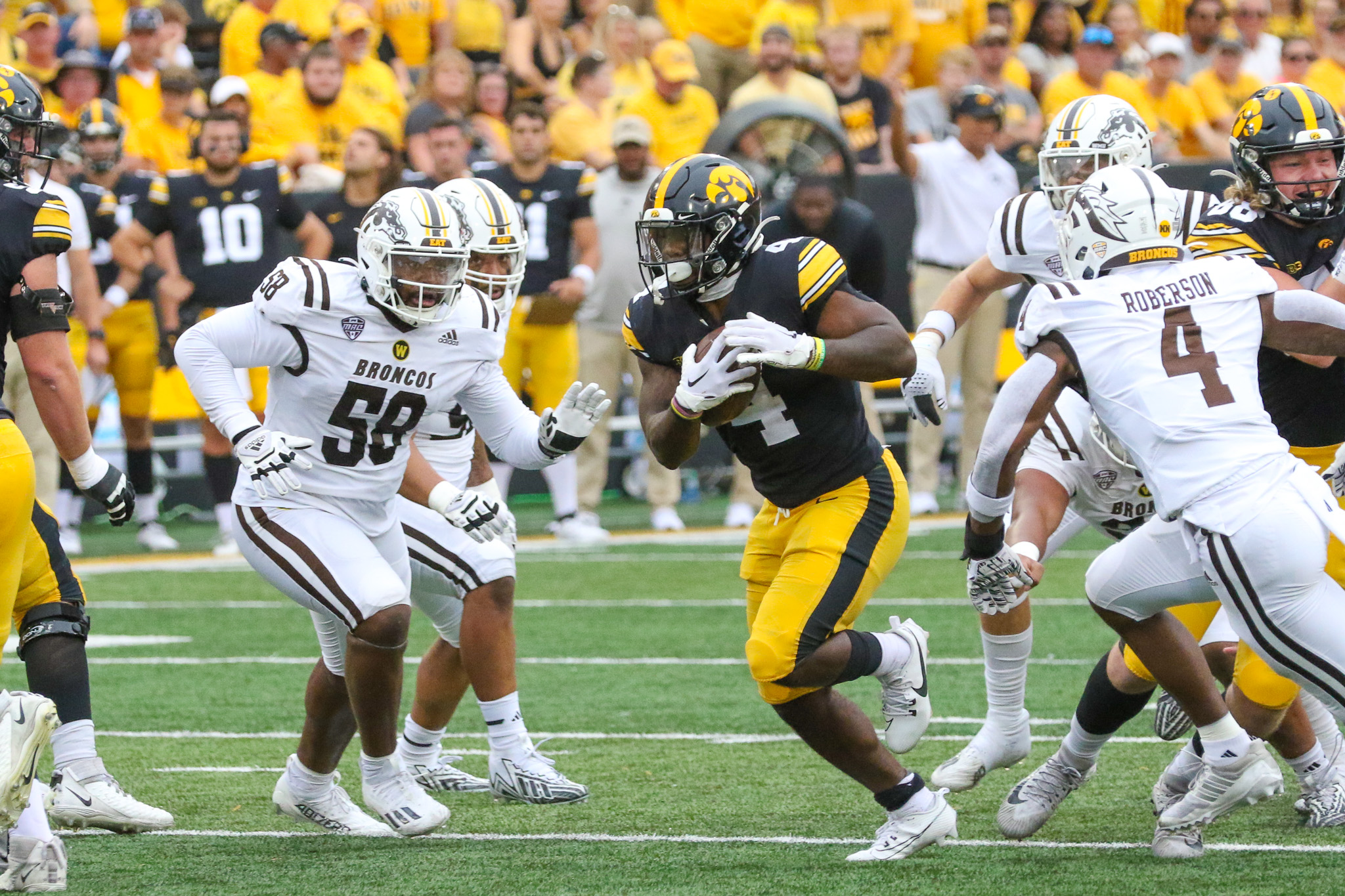Time for Iowa running game to live up to undeserving reputation for a change
By Pat Harty
IOWA CITY, Iowa – Say what you want about Brian Ferentz receiving preferential treatment, and question his play calling all you want if that makes you feel better.
But the inability to sustain a productive ground attack is hurting Iowa’s offense more than anything else.
How much blame should be directed at Brian Ferentz as the offensive coordinator is hard to say because this problem has festered for years and it started long before he became his father’s offensive coordinator.
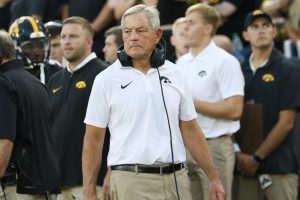
Since 2004, only once has Iowa finished higher than fifth in the Big Ten in average per-game rushing yards.
That was the 2008 season when Shonn Greene put the offense on his back by rushing for at least 100 yards in each of the 13 games.
Iowa averaged 188.7 rushing yards per game that season to rank fourth in the conference as Greene would go on to win the Doak Walker Award as the nation’s top collegiate running back in 2008.
But only five times since the 2008 season has Iowa averaged more than 150 rushing yards per game.
Iowa also has finished 10th or lower in the Big Ten in rushing 10 times since the 2004 season.
And yet, so often you will hear a member of the national media say that Iowa should get back to doing what it does best under Kirk Ferentz and run the ball.
That would certainly make things easier for Deacon Hill as he will make his first career start at quarterback for Iowa in Saturday’s game against Purdue at Kinnick Stadium.
The few times when the running game has stayed ahead of the chains since the start of last season, the offense has operated more smoothly and efficiently.
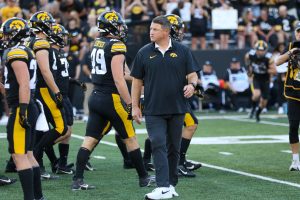
The quarterback has the luxury of throwing from play-action when the running game is clicking and being predictable doesn’t matter nearly as much.
Iowa head coach Kirk Ferentz was asked in his weekly press conference this past Tuesday what is missing in the running game.
“It’s a complex equation,” he said. “Offense is more complex other than just saying this, this, and this. The fourth quarter the other day, at least we looked like we were back kind of going the way we need to go.
“A lot of variables involved, certainly going to help us. This is a tough team to run the football against because of their front and the way they’re designed. We’re going to have to find a way, and we’re going to have to be patient, too, because there’s a lot of ugly plays when we play a team like this. Hopefully, you can find a crack or a crease and pop one through there.
“It’s not like you’re just going to run the ball five yards, five yards, five yards. That’s not realistic.”
What is so strange about Iowa’s long-standing rushing woes is that Kirk Ferentz’s area of expertise is the offensive line. He coached the Iowa offensive line for nine seasons under Hayden Fry 1981 to 1989 and for six seasons in the NFL.
Kirk Ferentz knows more about run blocking, and more about blocking schemes than just about anybody, and yet, his offense more times than not has struggled to run the ball.
Iowa has had 19 offensive linemen selected in the NFL draft under Kirk Ferentz, including five in the first round.
Iowa also has had two offensive linemen under Kirk Ferentz win the Outland Trophy as the nation’s best interior collegiate lineman – Robert Gallery in 2003 and Brandon Scherff in 2014 – while center Tyler Linderbaum was among three finalists in 2019.
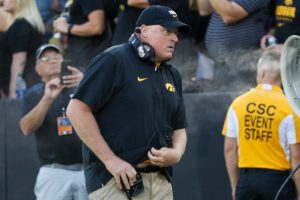
For reasons that are hard to explain, the individual parts on the offensive line have usually been better than the whole product.
George Barnett is in his third season coaching the Iowa offensive line, so he is far beyond the adjustment phase.
In fairness to Barnett, though, the running game has struggled and under-achieved long before he arrived.
Opponents are averaging 148.4 rushing yards per game against Purdue this season, while Iowa is averaging 107.0 rushing yards per game.
No one position group should take full blame when a rushing attack sputters, but the Iowa offensive line certainly deserves its share of the blame because there haven’t been many running lanes.
Iowa’s longest run in the two Big Ten games is just nine yards by Leshon Williams.
Iowa also has 135 negative rushing yards this season.
The loss of starter Kaleb Johnson to an injury, which caused him to miss the last three games, has made a bad situation worse.
But Johnson was only averaging 2.7 yards per carry after the first two games.
Youth and inexperience have been used as reasons why the offensive line has struggled recently. But that explanation doesn’t fit for this season because Iowa’s five starting offensive linemen have combined for 101 starts, led junior left tackle Mason Richman with 27.
Despite all the experience, the offensive line has failed so far to lift its performance level from last season, and that is perplexing and discouraging.
But there still are seven games remaining.
And if the players on offense are frustrated with the running game, they’re not showing it, at least not publicly.
Leshon Williams was asked Tuesday what needs to happen to fix the running game and his answer was encouraging.
“I would say I could set the tone better,” Williams said. “I could get down hill faster or make a couple guys miss.”
Instead of making excuses or pointing fingers, Williams looked in the mirror and talked about being accountable.
“It’s a team thing,” Williams said. “It’s not just the o-line.”
Williams lost a fumble against Michigan State last Saturday, but the Iowa coaches stuck with him and that meant a lot to Williams.
And while a cynic might say the coaches had no other choice but to stick with Williams due to the injuries at running back, Williams sees it differently.
“That’s very big,” Williams said. “It shows the coaches have confidence in me.
“A coach could say, dang he fumbled again and give up on you, next man in. But they came back to me and showed they have confidence in me. It really helped me mentally.”
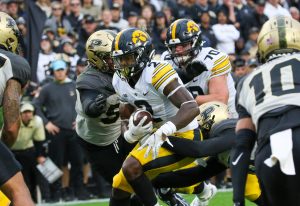
Iowa’s most lopsided win this season was the 41-10 victory over Western Michigan, a game in which Williams and his cohorts gained 254 yards on the ground.
The Iowa offensive line had a tremendous surge and dominated the line of scrimmage from start to finish.
It was Kirk Ferentz football at its finest.
But it also probably said more about Western Michigan’s defense than about Iowa’s running game.
Iowa finished 8-5 last season and its most impressive win might have been the 24-3 victory at Purdue as Kaleb Johnson rushed for a career-high 200 yards on 22 carries.
Former Iowa quarterback Spencer Petras also passed for 192 yards and two touchdowns in that game.
It was one of few times when Petras had the luxury of using play action, thanks to the running game, and one of few times when Iowa actually has lived up to its reputation as a running team.
Unfortunately, for Hawkeye fans, the Purdue game last season was an aberration rather than a sign of things to come.
Purdue also has new head coach in Ryan Walters whose area of expertise is defense.
So, if ever there were a time for Iowa’s running game to rise to the occasion, that time would be Saturday against Purdue.
And though Iowa’s passing game also leaves much to be desired, Kirk Ferentz’s offense is built around the running game, and when the running game sputters, the passing attack becomes less of a threat.
The good news is that Kaleb Johnson has a realistic chance of playing in Saturday’s game, according to Kirk Ferentz.
Because as a first-time starter, Deacon Hill will need all the help he can get from his running game.
Purdue vs. Iowa
When: Saturday, 2:33 p.m.
Where: Kinnick Stadium (69,250)
TV/stream: Peacock
Radio: Hawkeye Radio Network
Series record: Purdue leads, 50-40-3
In Iowa City: Iowa leads, 22-21-1
Last meeting: Iowa won 24-3 on Nov. 5, 2022 in West Lafayette, Indiana
